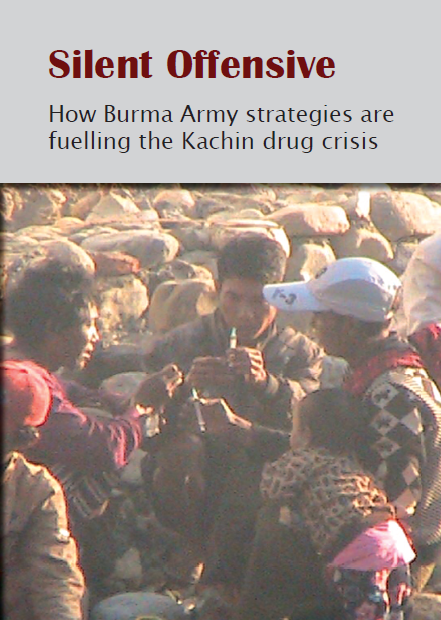Silent Offensive: How Burma Army Strategies are Fuelling the Kachin Drug Crisis
By Kachin Women's Association – Thailand • October 8, 2014This report, based on interviews with Kachin drug users, their family members, drug sellers, and community leaders in eight townships of northern Burma, paints a disturbing picture of the drug crisis in Kachin areas. It shows how the renewed conflict against the Kachin Independence Army (KIA) since June 2011 is fuelling drug production and worsening existing drug abuse among Kachin communities.
A key factor causing increased drug production is the Burmese government’s policy of allowing its local militia to grow opium, and produce heroin and other drugs, in exchange for fighting against the KIA. As the Burma Army and its allies have progressively seized control of Kachin areas, drug production has been increasing.
In Kachin State, the main opium growing areas now are in Chipwi and Waingmaw townships, under the Burma Army and its Border Guard Forces 1001, 1002, 1003 and 1004, led by Zakhung Ting Ying, formerly a Kachin ceasefire group leader and now an MP in Burma’s National Assembly.
However, the UNODC does not identify the Chipwi area as a “high-risk” opium growing area. Only Waingmaw and Tanai in Kachin State were designated “high-risk” and included in the UNODC 2013 opium survey. This throws into doubt the UNODC’s estimate of a 10% reduction in opium cultivation in Kachin State from 2012.metham
In Kachin-populated regions of northern Shan State, the main opium growing areas are in Muse District under the control of the Burma Army and thirteen government People’s Militia Forces, three of whose leaders are MPs in the Shan State Assembly. The KIA had formerly enforced opium bans in some of these areas.
Thousands of acres of poppy fields are being cultivated in these government militia areas, and are being taxed not only by the militia but by other government officials. Despite the taxes, increased numbers of villagers are turning to opium cultivation, as the conflict has prevented them growing other crops, and has blocked transport and markets. This includes displaced villagers, who risk travelling back to their farms to plant opium, or else work as laborers on others’ fields.
Not only opium growing, but also heroin refining and methamphetamine production, is taking place with impunity in government militia-controlled areas. These drugs are flooding into Kachin communities, worsening existing problems of drug abuse and addiction not only in poppy growing areas, but also in towns, mining sites, and along trading routes.
Although opium has been grown and used traditionally by Kachin villagers for decades, there are now much higher rates of opium use among poppy farming communities than in the past. In some opium growing villages, children as young as five are smoking opium. IDPs resorting to laboring on poppy farms are also becoming addicted.
In and around urban areas, such as Myitkyina, Bhamo and Lashio, where heroin is cheaper than opium, and easily available, there are alarming rates of heroin use among youth. It is estimated that about a third of students at Myitkyina and Bhamo universities are injecting drug users.
Heroin use is also rampant in mining areas. Many Kachin men, young and old, migrate from towns and villages to find work in jade and gold mines, where the harsh working conditions and isolation encourage drug use. Local residents estimate that 90% of workers in Hpakant jade mines are drug users. Drugs remain readily available in Hpakant despite the conflict, which has disrupted large-scale mining since 2012 […]
Download the full report in English Burmese here.
Tags: Burma Army, Burma Government, Drugs, IDPs, Kachin, Kachin Independence Army, Kachin Women's Association – Thailand, Methamphetamine, Opium, United Nations Office on Drug and Crime, YouthThis post is in: Drugs, Spotlight
Related Posts21st Century Panglong Conference Reaffirms Obstacles to Peace
Torture, extrajudicial killing, and use of civilians as human shields by Burma Army during new offensive against SSPP/SSA near Upper Yeywa dam site in Kyaukme
Time for a Fresh Start for Genuine Peace
An Open Letter to World Leaders on the Fourth Anniversary of The Resumption of War Calling Urgently for Humanitarian Aid for The Internally Displaced People of Northern Burma
The Burma Government Must Stop Condoning Sexual Violence in Conflict Areas










 All posts
All posts